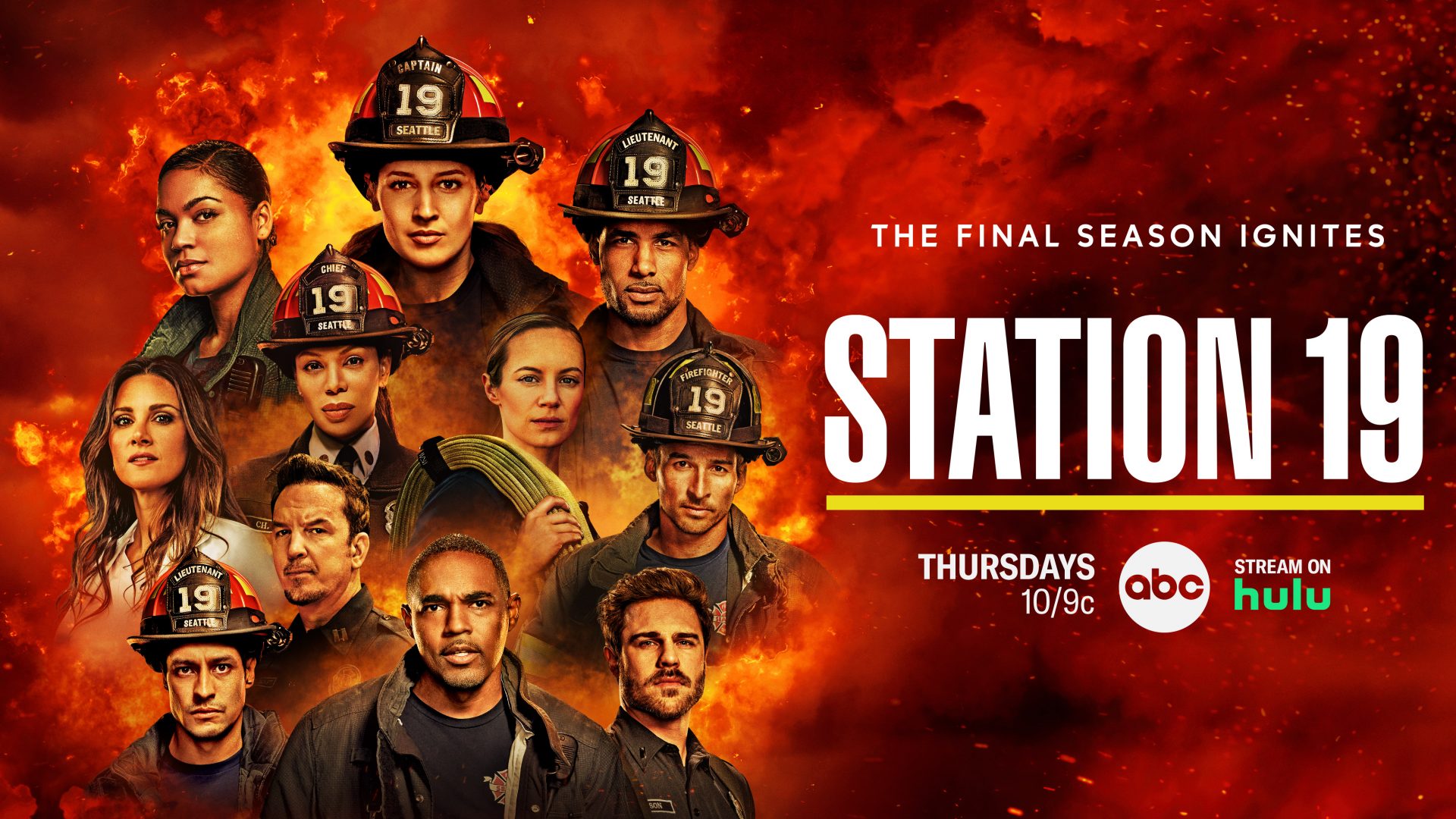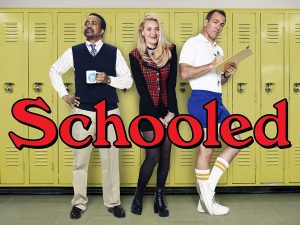On the evening of April 11, at the end of primetime, hundreds of voices counted down under their breath. Their fingers hovered over their keyboards, their eyes fixed to the screen, as they prepared to send a unified message.
The silence broke at 10 p.m., when a mass of messages flooded X, formerly known as Twitter, to celebrate the 100th episode of Station 19 (2019-2024), a spin-off of the popular drama Grey’s Anatomy (2005-present). Hundreds of tweets were posted within minutes of each other, all announcing “100 EPISODES OF STATION 19” and “#SaveStation19” to honor the milestone with the fanfare they thought it deserved.
Joyous as the commemoration was, it rang bittersweet, as fans grappled with an inescapable truth: the show’s days were numbered. ABC, Station 19’s network, announced in December 2023 that the procedural wouldn’t continue past its seventh season. News of the cancelation sparked disappointment, outrage and, for some, action.
The posts celebrating the series’ 100th episode revealed its effect on viewers. Many featured clips of Maya Bishop (Danielle Savre) and Carina DeLuca (Stefania Spampinato), one of the series’s most beloved queer relationships, alongside praise for Station 19’s queer representation.
Other tweets were more somber, with one fan writing, “100 episodes during which we laughed, cried, or were upset. 100 episodes during which we found friends, a family, a safe place. 100 episodes during which we fall in love with a cast. So we don’t want this show to stop.”
Station 19 follows a unit of firefighters in the Seattle Fire Department, splitting runtime between the first responders’ personal and professional lives. It’s known for its candid portrayal of current events, winning a Sentinel Award last year for its coverage of systemic racism, as well as its focus on queer characters—both of which have earned the series a devout fanbase.
Members of the campaign point to the relative success of the series in recent years. Its sixth season averaged 3.86 million viewers per episode, was among the top 50 most-watched series on network TV last year, and was consistently ranked as ABC’s second-best drama (behind Grey’s). The show was well-received by critics, winning 7 GLAAD Media Awards for queer representation in addition to the Sentinel.
“That [was] the main feeling from the fandom: we thought, for once, that we were safe,” Lauren, an activist and Save Station 19 member who spoke to the Voice on the condition that she be identified only by her first name, said. “This showed, like, ‘Not at all. It doesn’t matter if your show’s doing great in the ratings; it doesn’t matter if it’s a critical success; it doesn’t matter if it’s making money; it doesn’t matter if they’ve spent money on it.’”
Within days of hearing that the show was to be canceled, the six-year-old Station 19 fandom, a community usually sharing show-related content and inside jokes, pivoted to activism. In the months since, the fandom-turned-coalition has created a petition with over 85,000 signatures, raised over $13,000 on GoFundMe for campaign initiatives, and created a host of merchandise geared toward fundraising.
The campaign, now dubbed Save Station 19, has organized initiatives to raise awareness about the show’s cancelation and communicate to ABC that Station 19 is still valuable. The campaign’s achievements include renting billboards in Los Angeles and Times Square, conducting flyovers above Walt Disney Studios (ABC is owned by Disney), and organizing mass #SaveStation19 posts on important dates—like the series’s 100th episode.
Still, some efforts are more successful than others—even as hashtag #SaveStation19 has been used over one million times, live viewership has dipped in its seventh season.
The campaign’s goal is ambitious, but possible. While the advent of streaming has made one- or low-season shows increasingly prevalent, there are several recent examples of canceled shows that get picked up by other networks or streamers because of fan support—including The Expanse (2015-2022), Brooklyn Nine-Nine (2013-2021), and Arrested Development (2003-2019).
“We need to be realistic,” an activist in the campaign who spoke to the Voice on the condition of anonymity said. “We have to understand what the possibilities [are]—and it’s very hard. Some fandoms have succeeded before, others haven’t. But we can try. That’s what we always say: ‘We can try.’”
Members of the campaign said their passion stems from a years-long appreciation for Station 19—the cast, the crew, and the community it fosters.
“I’m from a small city,” she said. “My family—I’m not going to say they’re super conservative, but they’re conservative enough […] for me not to have the freedom of queer friends. Then I joined the fandom and suddenly, I had a lifeline of queer women.”
The organizer grew up in South America. She learned English by watching Grey’s Anatomy, which she’d viewed religiously since she was young. When the series’s showrunner, Shonda Rhimes, created a spin-off show about firefighters, it was only a matter of time before she hopped on. But she didn’t expect the effect it would have on her life.
“I was only able to understand my sexuality […] and come into myself, in a broader sense of the word, because of the show and because of the community I found thanks to the show,” she said.
Advocates laud Station 19 for being a series committed to the representation of queer women at a time when it’s backsliding. According to the Gay and Lesbian Alliance Against Defamation’s (GLAAD) report, at least 54 LGBTQ-inclusive series were canceled in 2023, including Batwoman (2019-2022), Killing Eve (2018-2022), and Dear White People (2017-2022). Its 2024 report found that of the 468 queer characters on television, 36% of them will not return next year. In this environment, the loss of Station 19’s Maya and Carina is especially impactful.
“We only have [so many] couples on network television,” Lauren said. “It’s not like, ‘Oh well, at least there’s 50 more that I can look at.’ I’m not on TV. I am nowhere on TV.”
While television has experienced important milestones in queer representation—such as 2022’s record-high number of queer characters—activists said these fail to account for shortcomings in queer portrayals on-screen. Lauren cites a few of these: queer people in television are disproportionately younger, shows privilege coming-out narratives, and they’re placed in fantastical premises. Unlike so many of its contemporaries, she argues, Station 19 defies those conventions.
“What makes Maya and Carina really unique […] is they are a very rare queer couple in a show that takes place in a real setting,” she said. “Most queer couples, for some reason, have found real popularity in genre TV. And that’s really fun. But there’s something very life-affirming about seeing two women in their thirties going to work.”
Campaign members said that in an environment where queer television is under threat and representation often fails to reflect the lives of everyday queer people, Station 19 gives audiences an unabashed, intimate look at queer love—a fact that made its cancelation all the more disappointing. But activists like Mariana Weber, a newer addition to the campaign, aren’t just upset by ABC’s decision to cancel the series; they’re dumbfounded.
“Overwhelmingly, a lot of our shows—and media that we’ve invested time and energy into—have gotten canceled,” Weber said. “This is the last straw. […] Station 19 was a no-brainer; it made no sense for it to be canceled.”
According to members of the campaign, Station 19’s writers were directed late last year to begin separating Station 19 plotlines from those in Grey’s Anatomy. This claim, backed up by a decrease in crossovers in the show’s sixth season, seemed a surefire sign that the series would outlive its two-decade-old predecessor. But these apparent signs of good health failed to foreshadow the series’s cancelation.
ABC has not officially disclosed why they canceled the series. However, in a February 2024 interview with Deadline, Disney Television Group president Craig Erwich said that the series was coming to its natural conclusion.
“Well, every show has its own journey, so to speak,” Erwich said in the Deadline interview. “In the case of Station 19, it was time to bring that story to an end. I love Station 19, and I think what’s amazing about Station 19 is that it was, yes, a spinoff of Grey’s. But it really became its own show that stood on its own creatively and was fully realized and unique unto itself, and we’ve been very proud to have it on the air.”
Many fans aren’t satisfied by that answer, pointing to the sheer number of active storylines, which the series will likely struggle to incorporate into its reduced, 10-episode final season, which premiered in March and will likely end in June. In an interview with TVLine, Station 19 showrunners Zoanne Clack and Peter Paige said that the cancelation forced them to cut multiple storylines and accelerate others.
“We definitely had some story ideas that we had to let go of,” Paige said to TVLine. “We had to say, ‘OK, well, that’s going to be a ‘Season Never’ story.”
“Yeah, there were a lot of things that we were thinking would be leading into Season 8,” Clack added. “It was like, ‘OK, either we don’t tell that story or we squish it way down and tell it in two episodes instead of as a season-long arc.’”
Many Save Station 19 members bristled at how little notice the cast and crew were given—Clack and Paige received word of the cancelation just a few hours before the information was made public in December 2024, casting doubt on the claim that this was a long-expected or natural decision.
“I think it’s a real shame, because the characters and the actors, they just deserve so much more than what they got,” Megan O’Kane, an Irish national and campaign member, said. “They haven’t really been given a proper reason as to why they canceled Station 19. It was just one of those things where they were called into their lunch break and told, ‘This is happening. You’re losing your jobs, all 300 of you. Now get back to work.’”
Despite Save Station 19’s best efforts, the show’s cast and crew may be left without a project to work on—and its fans, without a home. Campaign members, wary that their grievances might be criticized as dramatic or insubstantial, emphasize that Station 19 is more than a TV show, and that its loss shouldn’t be trivialized.
“I do think from an outside perspective, it’s likely very strange,” Lauren said. “It’s like, ‘People are spending money on billboards and flyovers. Why are they doing this? It’s just a show.’ But I think queer viewers watch TV differently than [cisgender and heterosexual] viewers. I think for a lot of people, it’s not just a show—it’s community.”
Fans of Station 19 and campaign members have made it clear: they’re fighting not only for a show, but for themselves.
“To the person who’s living somewhere where it’s not safe to be them, to the person who’s never met another queer person,” Lauren said, “that’s a lifeline.”






